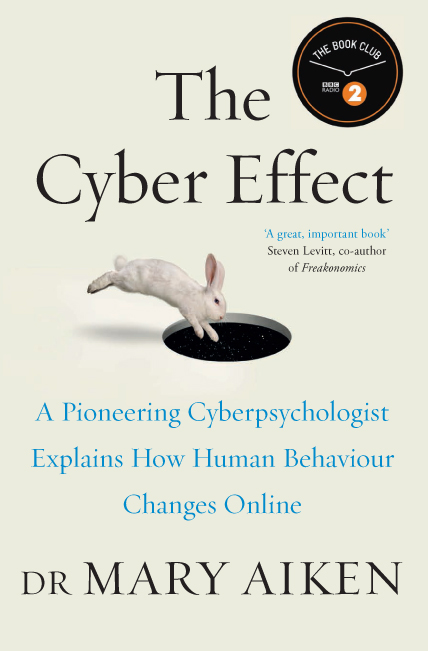
Courtesy of Mary Aiken
Mary Aiken (above) is a forensic cyberpsychologist.
A woman on a mission, she desires to change how we use emerging technology by explaining how it shapes our children and influences our behaviour and values.
Aiken is the author of The Cyber Effect, a splendid book describing the irresistible (and scary) world of technology and how it influences human lives and behaviours from cradle to grave.
From Internet addiction, cyber-exhibitionism, online predators, and teenage narcissism, to fake accounts (aka catfishing), digital hyperchondria, and cyber-criminals lurking in the Deep Web, the book brings us on a fascinating (and frightening) tour of why “the triple A Engine” of the Internet – anonymity, accessibility, and affordability – can become a recipe for delinquent behaviours.
Let us look at each one of these areas in detail, and consider the valuable lessons which we can apply in our lives.
How Cyber Fetishes Begin
Do you know why you are more likely to do risky activities online? Well, you’re probably under the illusion that the cyber environment is safer than real life.
Termed the online disinhibition effect, such emboldened behaviour coupled with online escalation (the snowballing effects of the Internet) leads to increasingly aggressive texts, offensive posts, derogatory comments, and flaming emails.
This is further aggravated by what Aiken termed online syndication – the act of fraternising online with like-minded others with similar interests. Through a process of cyber-socialization, these individuals feel hyper-connected to each other, and collectively regard deviant behaviours like exhibitionism or voyeurism as “normal.”
Calling online obsessions a “fetish,” Aiken drew on Freudian ideas of psychosexual development to explain why respectable politicians engage in unbecoming behaviours like photographing their genitals and sharing them with others. (Yes it happens!)
Designed for Addiction
Like it or loathe it, social technology and digital devices are designed to make you a digital addict.
Collectively, they trigger impulsivity (ie “a personality trait characterised by the urge to act spontaneously without reflecting on an action and its consequences”) and lead to the rise in Attention Deficit Hyperactivity Disorder (ADHD) in both children and adults.
Over time, this could also develop into obsessive-compulsive disorders akin to the digital equivalent of repeated hand washing. They include excessive online gaming (aka Internet gaming disorder), compulsive online shopping, and porn addiction.
Take note of the psychological principles at play here:
- Intermittent rewards: Also known as “fun failures,” this process of conditioning whereby random rewards are provided to you (eg points, “likes,” and levels) triggers a shot of feel-good dopamine to your brain.
- Seeking behaviours: Equated with ancient foraging, exploring, and investigative behaviours, the act of search actually stimulates our “mammalian motivational engine.”
- Related stimuli and signalling: From flashing lights to alerts and notifications like bells and vibrations, these cues help to reinforce addiction.
Digital Babies and Tablet Tots

It’s tragic to see young parents glued to their smartphones, while a tablet or smartphone is used as a “digital pacifier” for their babies and toddlers.
The danger, however, isn’t just in their brain development. Apparently, parents that do not look at their baby’s faces may stun their child’s emotional growth!
Warning: Not Looking at Your Baby Could Cause Significant Developmental Delays – Mary Aiken
Beyond that, the visual acuity of an infant that is developed during the first two years of life could also be marred by digital device use.
Toddlers with tablets could also suffer from over-stimulation, be hampered in using their imagination or creativity due to the lack of unstructured play, and possibly be primed for ADHD.
What about preschoolers? Apparently, that wonderful “educational app” that you’re showing to your little one is doing him little good.
Named the video deficit effect, developmental psychologists found that what can be achieved by live learning in a single instance takes repeated attempts using a video. Devices have also been shown to disrupt sleep.
To overcome this, do a “cyber-sweep” of your baby’s domain like the nursery, bedroom and family room. Banish anything with a digital chip or a blinking light. Go old-school with wooden trains, blocks and dolls.
You should also monitor your screen time. Be mindful of how often you switch on your television at home. Limit the frequency of checking your mobile phone in front of your baby or toddler.
Cyberbullied Kids
The online world can be a dangerous thing for school going kids.
Excessive use of technology could result in social alienation and isolation as kids spend less time interacting with one another. Cyberbullying is another common problem. A US survey found that one million children in a previous year were “harassed, threatened, or subjected to other forms of cyberbullying” on Facebook.
Cyberbullying led to the untimely suicide of vivacious and beautiful Sarah Lynn Butler, a 12 year old voted “queen of the fall festival” in her school. On her MySpace page then, she was called a “slut” along with other nasty descriptions.
In a survey of 8 to 12 year olds, it was reported that what bothered them most was witnessing pornography. Most alarmingly, online predators lurk wherever a device is plugged in, even right in your homes. Even murders among kids (ie older children murdering younger ones) could be nurtured by wayward online communities.
To protect your children online, do the following:
- Use parental control software, content filters, PIN passwords or safe-search
- Talk to your kids about managing online risks
- Set rules around online access and use
- Supervise your children when they are online
Teenagers and Tech

Courtesy of Huffington Post
Preoccupied with how they look and wanting to be part of the “IN” crowd, teenagers searching for their self identities could be adversely affected by the Internet.
The cyber effects and challenges they may face are wide ranging:
- Mirroring behaviours: deriving their identity or self-image by looking at their own selfies. This highly manipulated cyber self which they’ve conjured may become more important than their real lives.
- Lack of real feedback due to the falsifying images created online, leading to unrealistic views of themselves.
- Narcissism (preoccupation with self) which is aggravated by online filters and apps. This could possibly lead to premature sexualisation of the teen.
- Increasingly risky behaviours like sexting (sending of sexually suggestive photos, videos or texts to others), revenge porn (sharing indecent images of ex-boyfriends or ex-girlfriends to get back at them), and even sextortion (blackmailing by threatening to post explicit images more widely on the Internet.)
To prevent these behaviours, you should talk to your teens on…
- Their real-world day and what’s happening in their cyber life
- The risks that they can face in the real and online world
- The formation of identity and why they need to distinguish between their real world and cyber self
- Issues such as body dysmorphia, eating disorders, body image and self-esteem
- The importance of NOT allowing themselves to be treated as a sex object – regardless of their gender
Digital Love (and Lust)
From Tinder to Match.com, online dating has grown by cyber leaps and bounds.
Unlike the real world, however, we are more likely to reveal intimate details of ourselves online due to the phenomena called hyperpersonal interaction. Due to the lack of visual cues, trust online is created almost solely by self-disclosure.
Unfortunately, this may lead to trouble as we may end up revealing too much about ourselves, exposing ourselves to unnecessary danger. Exacerbated by the effects of online syndication and disinhibition, we may also end up trusting people too prematurely.
Taken to extremes, identity deception which occurs online could lead to the following ill effects:
- Catfishing: The creating of a fake online identity, often for the purpose of deceiving others for money or companionship
- Trolling: Individuals who deceive others for the joy of deceiving. This ranges from sexual harassment, lewd comments, and name-calling to cyber-exhibitionism and threats.
- Cyber-infidelity: The use of apps for cyber-affairs (think Ashley Madison.)
- Virtual Girlfriends: Unique to Japan, where games known as “dating stimulators” help lonely single men to bond with a “consoling, supportive, and nurturing” virtual partner.
Avoid the pitfalls of online love traps by paying attention to your human feeling. Connecting with real humans in a physical environment may also be a good thing, and never totally trust the profile photos which you see online.
Cyberchondria
Affectionately called the worried well, those who are ill (or who think that they are ill) have a wealth of online resources to feed their imagination.
A phenomenon triggered by the algorithms of search engines (see online filter bubbles), the problem with such self-diagnostic behaviours is that half of the medical information on the Internet has been found by experts to be inaccurate or disputed.
With populations ranging in the hundreds of millions, virtual medical communities can be dangerous places for hypochondriacs to gather and feed on each other’s neuroses. What’s more, many of these forums are populated by “experts” whose identity and credentials cannot be verified.
This combination of symptom and algorithm could lead to anxiety, and worse, mis-diagnosis, resulting in individuals seeking unnecessary treatments. It may even snowball into what’s called the Munchausen syndrome (now called functional neurological symptom disorder) whereby patients falsify symptoms or signs of illness.
To prevent yourself from becoming a cyberchondriac, Aiken recommends that you let qualified medical professionals do their job and follow her own motto caveat inquisitor which is translated to “Let the searcher beware.”
Cyber Criminals on the Prowl

Perhaps the most scary of all, Aiken’s revelation of online criminal activities happening in the Deep Web brought a chill to my spine.
Referring to the un-indexed part of the Internet, it accounts for 96 to 99 percent of content on the Internet and is vastly larger than the Surface Web which we’re familiar with.
So what are the nefarious activities happening here?
- Identity Thefts: From credit card fraud, cellphone hacking, data hacking, data destruction to cyber-extortion, identity theft is one of the top global security concerns.
- Darknets: Referring to what’s deliberately hidden, untraceable and unfindable, the Darknets are cyber coves for illicit digital black markets. Using browsers like Tor, they have anything from “blogs, forums, chat, anonymous file hosting, anonymous financing, anonymous tipping and information exchanges, information on computer security, info on warez/cracks/hacking, all the books, music, movies you can possibly imagine, even links to sports betting and trade information, links to international drug markets, prostitution rings, assassin markets, black market products, and child abuse material.”
- Crime as a Service (CaaS) Online: No, your eyes are not fooling you. Proffering anything from illicit drugs to weapons, these hidden services have discount days, coupon codes, two-for-one specials, money-back guarantees, and even loyalty points. They also offer escrow services, and can hold your money until your package arrives safely.
- Crypto-Markets: These sell contraband items on the Darknet, and include names like Silk Road, Evolution, Agora, Sheep, BlackMarket, Reloaded, AlphaBay, and Nucleus.
- Illegal Downloads and Hacks: From The Pirate Bay (a site using bit-torrent technology to download large files for no charge – free games, videos, movies, songs, books, or apps) to hackers, the David-vs-Goliath coolness of cyber pirates make these swashbuckling cyber agents less nefarious to the average citizen. However, criminal hackers have been known to introduce a whole host of malware and other cybercrime tools like worms, Trojans, spyware, keyloggers, ransomware, and rootkits to their hapless victims.
Fortunately, law enforcement agencies around the world are starting to take notice.
International cyber police forces in Europe and Asia have began working on cross-border cybercrimes, and a new field of cyber law is arising to implement greater regulation on cyberspace.
To combat cybercriminals, Aiken also urged us to think like one. We would also find ways to co-opt the buccaneers of the Web to be part of the solution, and get them help target organised cybercriminals and counter criminal forces and neighbourhoods.
What We Can Do About It
At the end of the book, Aiken suggests that technology could be better harnessed for good and not evil if greater top-down control is enforced.
Beginning with efforts in digital literacy, authorities around the world could both educate and enforce positive Internet behaviours, and regulate the online world like how they do the physical one.
This includes implementing a trans-disciplinary approach where the architecture of the Internet could be structured to be “human” friendly rather than “user” friendly, with stronger regulations to protect individuals, especially the young, from digital dangers.
Echoing the thoughts of Tim Berners-Lee, a cyber “Magna Carta” could even be proposed, one where governments take a more proactive stance in protecting their citizens from the ill-effects of the Internet.
Overall, The Cyber Effect is a fabulous and enlightening read. I highly recommend this for anybody keen to understand the psychological dimension of online dangers, and what steps we need to take to harness the Internet for good and not evil.

